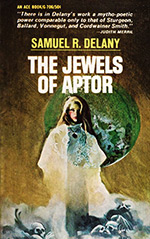
![]() couchtomoon
couchtomoon
10/15/2014
![]()
Since I purchased this book, and for the rest of my life beyond that moment, my brain has decided to call this novel The Sword of Aptor instead of The Jewels of Aptor. I don't know why. I don't remember many swords in the novel—knives mostly—but this is what my brain has decided to call this book, every time, for whatever reason. I have to correct myself in my head. It's about jewels! There is no sword! The title of the book is very straightforward!
In a vague, post-apocalyptic future with no electricity, a group of freelance sailors, including a poet and a four-armed psychic mute, are beckoned by the goddess Argo to steal back her mystical jewel from the dark god Hama. The mission takes them to the island of Aptor, a place where few men can escape, and no man wants to return. (And what about the women, ahem?) While there, the group encounters strange sights, consequences of a long dead and forgotten nuclear age, while uncomfortable changes in perception cloud their judgment, and cause them question their assumptions about good and evil.
Having read the delicious and fun Babel-17, and having heard equally good things about Delany's other major works (Dhalgren, Nova, Einstein Intersection), Delany has been on my radar for some time. The Jewels of Aptor, however, being his first novel, published at 19-years-old, and combined into an Ace double paperback with James White'sSecond Ending, isn't likely to be his best work. It was more of a tangential read that I just happened to come across, rather than anything I sought out. Unfortunately, and surprising because this IS Delany, this is probably one of the most poorly styled books I have read in a while. (And I read a bunch of those Retro Hugo nominees from 1939 this summer!)
The man who delivers Babel-17 with prose like "evening brushed blue fingers on his eyes," (ch. 1) and "ambition like a liquid ruby stains your brain...," (ch. 3), is absent in Jewels, although there are some moments that sort of hint that this is written by the same person ("Light on the upturned faces made them look like scattered pearls on the dark floor" [p. 126] is a rare example). But most descriptors are essentially blocky and blunted, like those square speed bumps that you can't get over with slow inertial motion, but go too fast and it'll fuck up your car and your neck.
Yet, one of the lead characters is a poet, and the goddess Argo likes to speak in stanzas, so the plot is dappled with what could be called poems, although they feel more like riddles for a kid's book:
"Freeze the drop in the hand
and break the earth with singing.
Hail the height of a man
and also the height of a woman..."
Outside of these stanzas, rather than imbue the body of the narrative with poetry, much of the story is pushed forward via stilted dialogue that is peppered with responses like "Oh," and "Huh?"
"Do you think we could climb that?" asked Geo. "It doesn't look too steep."
"For what?" Urson wanted to know.
"To get some place high enough to see if there's anything that looks like a temple."
"Oh," said Urson in a reconciled voice. (p. 76)
That kind of dialogue makes me chuckle. I know a lot of you writerly lunatics types will be competing in the anti-artistic fury impassioned commitment of NaNoWriMo next month and all I ask is that you, for reader's sake, Please. Don't. Do. Dialogue. Like. That. What a waste of words.
But, this is "Chip" Delany, and even at the age of 19, some of that brilliance is lurking beneath this clumsy story, be it unmolded, untrained, and unactualized. The plot itself is stodgy and plain, but once on Aptor, our heroes find themselves struggling to stay loyal to the mission. The dark lord Hama doesn't seem like a bad guy; the white goddess Argo is kind of a psychopath. The jewels are powerful because they can be used to control people. Do our heroes really want that kind of power back in the hands of the white, and supposedly good, goddess? Are good and evil that easy to delineate?
And, speaking of black and white, and also because this is Delany, we actually have characters of color, who blend in with the cast of heroes, rather than stick out as stereotypical non-white supporting characters. A lead character has ebony skin, other characters have dark skin, and that's all that really matters. Early on in the story, Delany subverts the typical "black guy dies first" handicap and a sailor named "Whitey" is murdered. Few women make an appearance in the novel, but the spunky redhead who needs saving manages to do most of the escaping by herself. She may be an early prototype for our beloved Rydra Wong.
But despite Delany's attempts to rehabilitate the fantasy world, it's just a poorly styled story that's not a very fun read. Definitely only recommended for die hard Delany fans who want to see the master's work before he blew away the SF world.
http://couchtomoon.wordpress.com